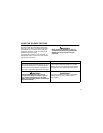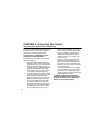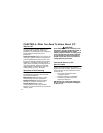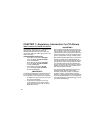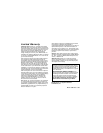
20
CHAPTER 7: Regulatory Information for CO Alarms
What Levels of CO Cause an Alarm?
Underwriters Laboratories Inc. UL2034 defines
three specific alarm points by which all
residential CO alarms must sound. They are
measured in parts per million (ppm) of CO over
time (in minutes).
UL2034 Required Alarm Points:
• If the alarm is exposed to 400 ppm
of CO, IT MUST ALARM BETWEEN
4 and 15 MINUTES
• If the alarm is exposed to 150 ppm
of CO, IT MUST ALARM BETWEEN
10 and 50 MINUTES.
•
If the alarm is exposed to 70 ppm
of CO, IT MUST ALARM BETWEEN
60 and 240 MINUTES.
IMPORTANT!
CO alarms are designed to sound before there
is an immediate life threat. Since you cannot
see or smell CO, never assume it’s not present.
• An exposure to 70 ppm of CO for 4 hours
may cause headaches.
• An exposure to 400 ppm of CO may
cause headaches in average, healthy
adults after 35 minutes, but can cause
death after 2 hours.
IMPORTANT!
This CO alarm measures exposure to CO over
time. It alarms if CO levels are extremely high in
a short period of time, or if CO levels reach a
certain minimum over a long period of time. The
CO alarm generally sounds an alarm before the
onset of symptoms in average, healthy adults.
Why is this important? Because you need to be
warned of a potential CO problem while you
can still react in time. In many reported cases of
CO exposure, victims may be aware that they
are not feeling well, but become disoriented
and can no longer react well enough to exit the
building or get help. Also, young children and
pets may be the first affected.
The average healthy adult might not feel any
symptoms when the CO alarm sounds.
However, people with cardiac or respiratory
problems, infants, unborn babies, pregnant
mothers, or elderly people can be more quickly
and severely affected by CO. If you experience
even mild symptoms of CO poisoning, consult
your doctor immediately!




